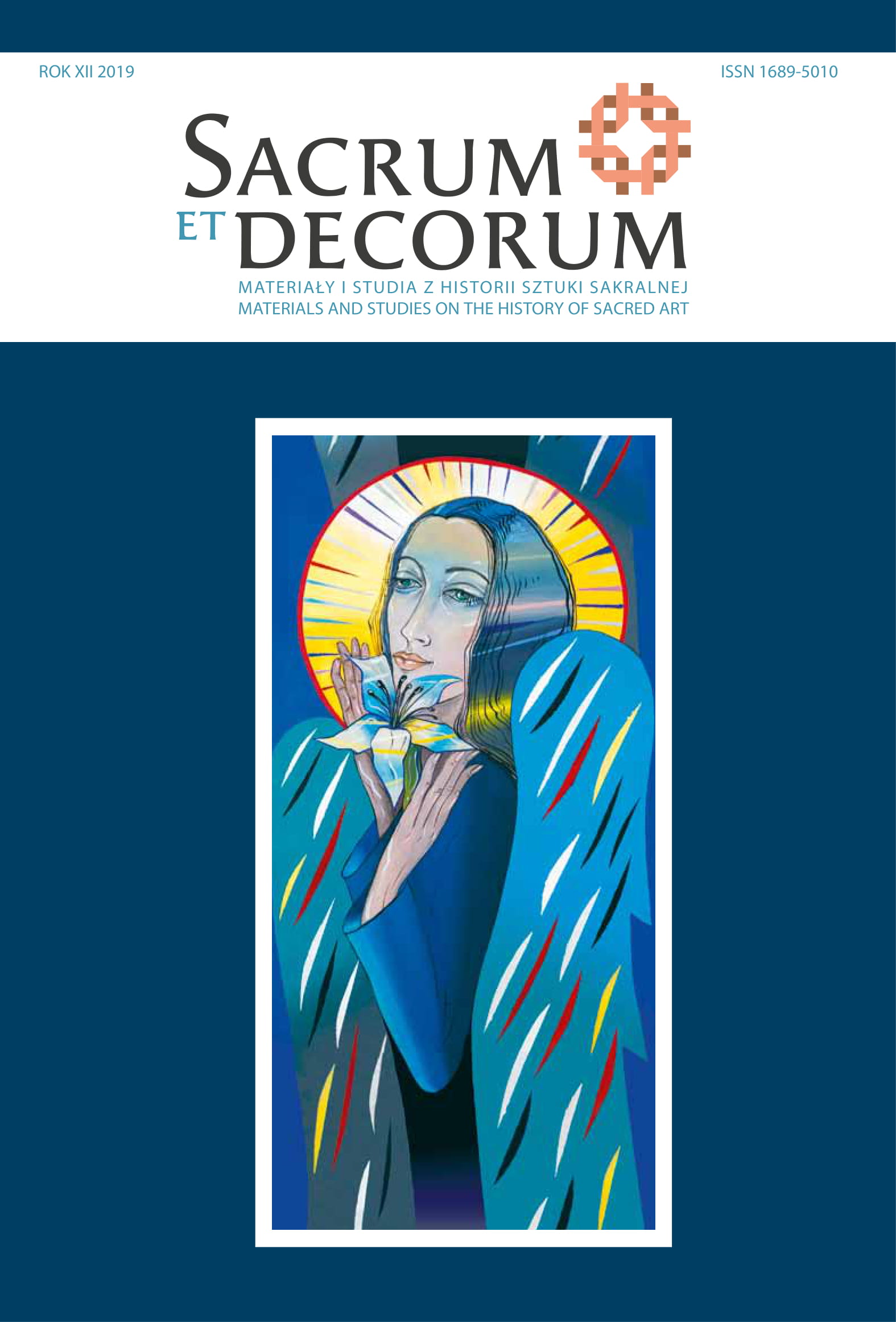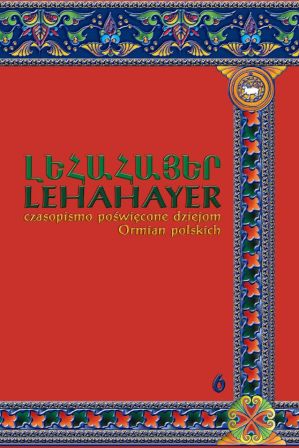Author(s): Andrzej A. Zięba / Language(s): Polish
Issue: 6/2019
The inauguration of the Research Centre for Armenian Culture took place on January 21, 2019 at the Collegium Maius of the Jagiellonian University in Krakow. The Centre was founded on the basis of old and contemporary achievements of Kraków armenologists and armenists. They were accompanied by the constant interest of Polish Armenians – from Kraków, Warsaw, Gdańsk, Lower and Upper Silesia. Such support was invaluable in the efforts to create the Centre, because it demonstrated not only the scientific but also the social need for research in this field. In this atmosphere, in recent years, important initiatives for Polish armenology were born – the magazine Lehahayer, devoted to the history of Polish Armenians, financially supported by the Lanckoroński Foundation, the Jagiellonian University and the Gumiński Foundation (this year, the 6th edition will be released), and a series of archival sources, Historical Monuments of Polish Armenians, implemented under the care of the Foundation for Culture and Heritage of Polish Armenians thanks to a grant from the National Humanities Development Program. In organizational terms, however, these activities were semi-private or, so to speak, partisan. They were institutionalized when the Centre was founded. Efforts to create the Centre began in 2014. They were supported by written and oral recommendations from prof. Franciszek Ziejka, prof. Krzysztof Penderecki, prof. Claude Mutafian, prof. Andrzej Pisowicz, prof. Andrzej Nowak, prof. Peter Cowe, Mr. Edward Mier-Jędrzejowicz, and Mr. Armen Artwich. At the Polish Academy of Arts and Sciences we met with a friendly reception from prof. Jerzy Wyrozumski, secretary general, and prof. Jan Ostrowski, the current president. Of course, we would not be here if not for the positive decision of the Minister of Science and Higher Education and the Deputy Prime Minister, Jarosław Gowin. This decision determined that the Centre would be created. It proves the current Polish government’s concern for the heritage of national minorities of the historical Polish Commonwealth, including the lands of the old Grand Duchy of Lithuania. We count on the continued support of all these people and institutions. We want to cooperate in the construction of the Centre with armenological institutions in the close and distant neighborhood: Budapest, Cluj-Napoka, Minsk, Kyiv, Lviv. We see the need for comparative research on related communities of the Armenian diaspora in Poland, Transylvania, Belarus, Pokucie, Bukovina, and Ukraine. That is, over those Armenians, whom we call somewhat jokingly a «hurut tribe» due to a common taste for ganjabur soup made from hurut, or «lamb people» due to the popularity of the Angelus cum labaro coat of arms among Armenian communities and families throughout the whole Central European homeland. Archival queries, analytical research and the dissemination of its results are the main forms of the Centre’s work. We do not start from zero level. We will continue the two already mentioned ventures of our research milieu: editing the annual Lehahahyer and editing historical sources in the series Historical monuments of Polish Armenians. We also want to participate in the creation of research instruments for Polish armenology: bibliographies and biographical dictionaries, digitizing archival sources threatened by destruction. We also plan to create an electronic English-language scientific Encyclopedia of Polish Armenians. Of course, each of the Centre’s employees will also carry out or continue individual research, including the history of the Armenians in Lviv, Kamieniec Podolski, Lublin and other settlement centres, the Church, the nobility of Armenian origin, the martyrdom of Polish Armenians in the former Eastern Borderlands during the Second World War, the relations between Poland and Armenia and the Polish response to the Armenian genocide in the Ottoman Empire. Since the Centre is only at the stage of creation and has a limited budget, it cannot employ all researchers who are willing to deal with the history of Polish Armenians and various aspects of Armenian culture. For now, the following persons with doctoral degrees will cooperate with the Centre on a permanent basis: Jakub Osiecki, graduate of the Jagiellonian University, specializing in the history of the Armenian Church and Polish-Armenian political relations in the 20th century; Franciszek Wasyl, graduate of the University of Rzeszów, author of works in the field of historical demography of Armenians in Austrian Galicia; Marcin Łukasz Majewski, graduate of the Catholic University of Lublin, historian of cities and urban bourgeoisie and author of the work on Armenians in Piotrków Trybunalski; Tomasz Krzyżowski, graduate of the Pontifical University of John Paul II in Krakow, specialist in the history of the Armenian Catholic Church in Poland in the 19th and 20th centuries. In the work on the projects mentioned above, we count on the support of the members of the Centre’s Council, which includes both eminent scholars and representatives of Polish Armenians and institutions supporting armenological research in our part of Europe. These are (in alphabetical order): Monika Agopsowicz, member of the Council of the Foundation for Culture and Heritage of Polish Armenians in Warsaw, author of historical publications on Polish Armenians; prof. George Bournoutian, historian, armenologist, specialist in Iranian studies, lecturer at Iona College, co-editor of Encyclopaedia Iranica; prof. Armenuchi Drost-Abgarjan, an outstanding researcher of the Christian Orient and Byzantine culture, armenologist, lecturer at Martin-Luther-Universität Halle-Wittenberg; prof. Armen Edigarian, mathematician, vice rector of the Jagiellonian University; Armen Khechoyan, general director of the Aniv Foundation for Support of Armenian Studies (Minsk-Moscow-Yerevan); Zbigniew Manugiewicz, chairman of the Supervisory Board of the PMP Group corporation, co-author of the bestselling book about the town of Kuty on Pokucie, which was the motherland of many Armenians living in Poland today; prof. Lidia Matynian, director of the Institute of Choir Conducting, Music Education and Rhythmics at the Academy of Music in Kraków, former vice-rector of this Academy, conductor and head of the Boys’ Philharmonic Choir; Edward Mier-Jędrzejowicz, a representative of the Armenian minority in the Joint Commission of the Government of the Republic of Poland and National and Ethnic Minorities, ambassador of the Order of Malta in the Republic of Cyprus; prof. Claude Mutafian, historian, armenologist, mathematician, lecturer at Université Paris XIII, foreign member of the National Academy of Sciences of the Republic of Armenia; prof. Józef Naumowicz, patrologist, byzantologist, head of the Department of Ancient History at the Cardinal Stefan Wyszyński University in Warsaw, deputy chairman of the Byzantine Commission of the Polish Academy of Sciences, rector of the Armenian Catholic St. Grigor Narekatsi parish in Warsaw; prof. Judit Pál, historian, specialist in the history and ethnic relations of Transylvania, author of works on the history of Transylvanian Armenians, lecturer at the Faculty of History of the Babeş-Bolyai University in Cluj-Napoca; prof. Andrzej Pisowicz, specialist in Armenian and Iranian philology, nestor of Krakow Armenian studies, former head of the Chair of Iranian Studies and former deputy director of the Institute of Oriental Studies of the Jagiellonian University; prof. Ara Sayegh, from the Wrocław University of Technology, president of the Armenian National Committee of Poland; prof. Ewa SiemieniecGołaś, linguist, head of the Chair of Turkology at the Institute of Oriental Studies of the Jagiellonian University, member of the Committee for Oriental Studies of the Polish Academy of Sciences, vice president of the Polish Orientalist Society; prof. Krzysztof Stopka, historian, head of the Chair of History of Culture and Historical Education at the Institute of History of the Jagiellonian University, director of the Jagiellonian University Museum, chairman of the East European Commission of the Polish Academy of Arts and Sciences.
More...


